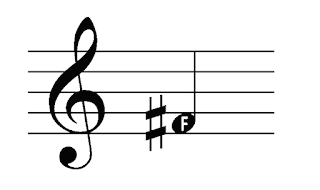Question from a reader:
"What's the meaning of an accidental in music?"
ACCIDENTALS
Answer:
Accidentals are notes you don't normally expect to see in a particular key or scale. They are the extra sharps, flats, or naturals in the music that are not included in the key signature.
For example, in C major, which has no sharps or flats in the key signature, any note with a sharp or flat is considered an accidental.
C-D-E-F-E-D-F#-G
In G major, which has an F sharp in the key signature, the F sharp would not be considered an accidental because it is part of the G major scale. Any other note that is changed by a half step would be an accidental.
G-F#-G-D-D#-E-C-B
An accidental is a sign used to raise or lower the pitch of the note. Remember that an accidental does not affect the same note of a different octave, unless indicated by a key signature.
Playing Closer To The Black Keys
When you play pieces with accidentals, try to move your hands a bit closer to the black keys. The closer you are hard-to-reach notes, the faster you'll get to them. This will make the passages easier to play, and they will sound smoother, too.
To see how this works play the example below twice. The first time place your fingertips at the very edge of the keys. The second time, your fingers should move in closer to the black keys. do you notice any difference? Which way is easier for your hands? Which one sounds better and smoother?
C-D-Eb-F#-G-F#-G or C-D-Eb-F#-G-Eb-C
Interesting Fact
You have probably noticed that when we say F sharp, the name of the note comes first (F), and then we say sharp but in the music the sharp is written before the note, not after it.
Still not clear on the purpose of accidentals? Check out, what-purpose-do-accidentals-serve-in-music, especially read through to the very end on passing chords and grace notes.
Blessings,
"The beautiful thing about learning is that no one can take it away from you." B.B.King












![Validate my Atom 1.0 feed [Valid Atom 1.0]](valid-atom.png)








No comments:
Post a Comment